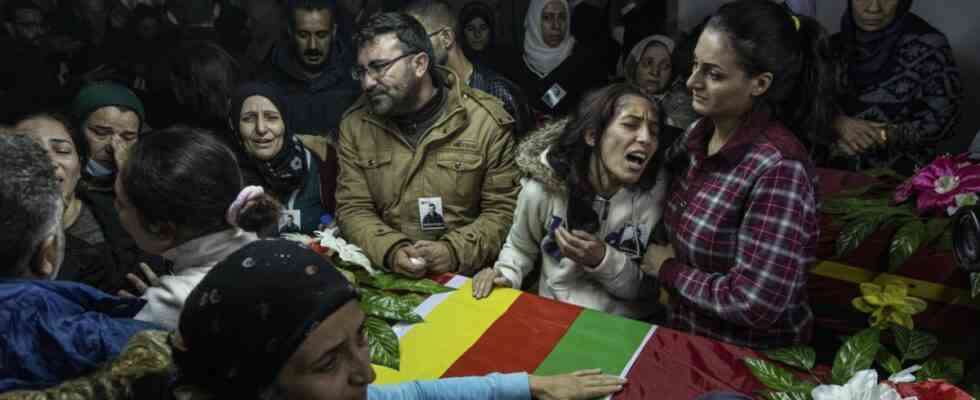The Iranian regime has moved military units to Kurdish-majority cities in north-western Iran and has apparently given its soldiers orders to shoot. The Tasnim news agency, which is close to the Iranian Revolutionary Guards, reported on Monday that “ground troops” were deployed to “clean up” the Kurdish cities of Bukan, Mahabad, Oschnaviyeh and Piranshahr.
The cities mentioned are all in West Azerbaijan, not far from the border with Iraq. Eyewitness reports from the province are leaking out that the actions of the Iranian Revolutionary Guards are reminiscent of the methods used by the Syrian dictator Bashar al-Assad to quell the protests in the first years of the civil uprising in Syria.
Worrying news is also coming from the western Iranian province of Kermanshah, which also borders Iraq. According to activists, dead civilians shot by security forces are said to be lying on the streets of Javanrud, a town of 43,000 people. Because of the hilly surroundings and the roadblocks, Javanrud is completely cut off from the outside world. Over the phone, residents reported that troops from Tehran, together with a Revolutionary Guards brigade stationed in Javanrud, patrolled the streets and continued to shoot at passers-by.
Escape to the border region
Observers fear that Iran’s revolutionary leader and religious leader Ali Khamenei has now given the green light for purely military action against the protesters. “Nevertheless, switching to brutal action against the protest movement is an admission that the regime’s survival is actually at stake,” says Kurdish analyst Rohan al Ameen, who lives in the Kurdish university town of Sulaymaniyah in Iraq. In the Iraqi-Kurdish border region, more and more people are said to have been arriving for several days to get to safety from the security forces’ offensive.
The Tasnim news agency is trying to prove with reports of success that the situation in large parts of Iran is under control again. But the mere mention of the numerous places where citizens dare to go out and demonstrate makes many Iranians doubt the statements. In Piranshahr, the Artesh units of the regular army and the units of the Revolutionary Guard have control of the city center, but are repeatedly attacked by Kurdish rebels, Tasnim reported.
More people on the streets than before
In the provinces of Sistan and Balochistan, even more people have recently taken to the streets than before. Human rights activists counted 16 protest marches in twelve cities nationwide on November 21 alone. The actual number could be much higher, since videos, photos and reports are often only distributed after several days due to the internet blockade imposed on many provinces.
On Monday, Mohammed Kazem Al Sadeq, Iran’s ambassador to neighboring Iraq, gave the Iraqi government a 10-day ultimatum. That’s how long Iraqi units would have to disarm militant Kurdish units in Iraq. The autonomous Iraqi Kurdish region has been a haven for armed groups and politically persecuted people from Iran and Turkey for years.
Parliament refused to discuss it
However, the newly elected government of Iraqi Prime Minister Mohammed Shia’ al-Sudani is at odds with the Kurdish autonomous authorities over the distribution of Kurdistan’s oil revenues and does not have the military means to expel the Iranian Kurdish groups from there. Iran’s threat could trigger a political conflict between Kurds and Shiites in Iraq. In the Iraqi parliament on Tuesday, pro-Iranian parliamentarians prevented a discussion about the Turkish airstrikes and Iranian actions on Iraqi territory.
The Iranian regime is also going on the offensive when it comes to nuclear agreements. In a letter to the atomic energy organization IAEA, the authorities announced that they would increase production capacity for uranium hexafluoride, a raw material for the manufacture of nuclear fuel elements, from Tuesday. Production of uranium enriched to 60 percent has started at Iran’s Fordow nuclear facility. The 2015 nuclear deal set a threshold of 3.67 percent. Uranium enriched to around 90 percent is required to build atomic bombs.

